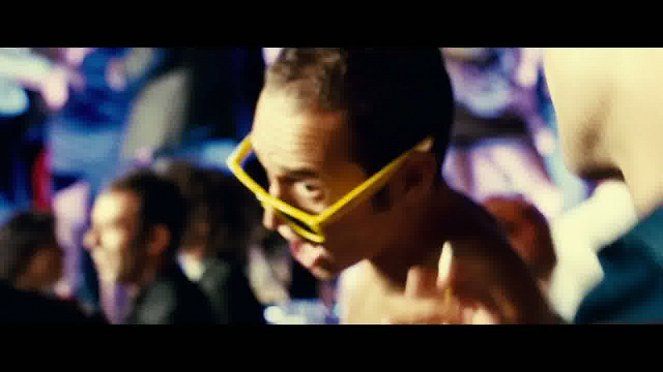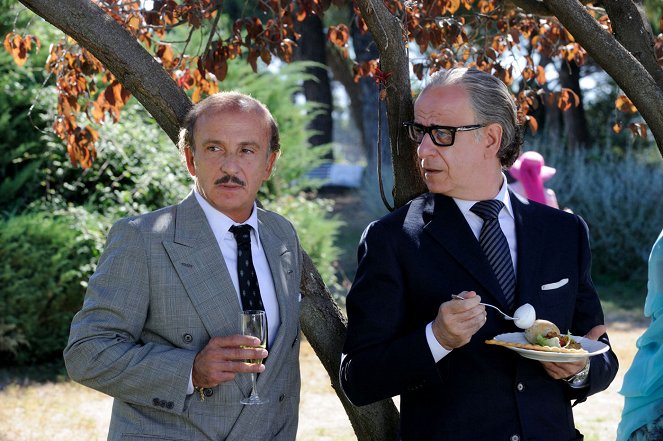Ohjaus:
Paolo SorrentinoKuvaus:
Luca BigazziSävellys:
Lele MarchitelliNäyttelijät:
Toni Servillo, Sabrina Ferilli, Carlo Verdone, Carlo Buccirosso, Isabella Ferrari, Giorgio Pasotti, Franco Graziosi, Serena Grandi, Luca Marinelli (lisää)Juonikuvaukset(1)
Fellinin La Dolce Vitaa versioiva SUURI KAUNEUS esittelee Jep Gambardellan (Toni Servillo), ikääntyvän pintaliitäjän, joka havahtuu syntymäpäivillään elämänsä tyhjyyteen 40-vuotisen juhlinnan jälkeen. Rooman sykkivät kadut ja hohtavat marmoripalatsit tarjoavat typerryttävän komeat puitteet menneisyyden kohtaamiselle. (Cinema Mondo)
Videot (3)
Arvostelut (9)
Crisis as a pose, beauty as the only principle of construction. Sometimes it works wonderfully (the introduction and the conclusion), whilst other times it's empty, ostentatious, unnecessarily eloquent and awkwardly theatrical. Even the biting irony is only about halfway there. Sorrentino is an excellent director, but unlike Fellini's "Roman frescoes", which are internally experienced and in every chord accurate, he realizes the idea of a nostalgic protagonist in crisis much less convincingly, but all the more heinously and loudly. A film that plays at being a classic just like the protagonist plays at being a blessed man of the world. Sorrentino had already made films that are an order of magnitude better, but also less affectionate.
()
We've seen this before. The Great Beauty is a clear tribute to the famous Fellini film La Dolce Vita, and the comparison with this film is obvious and made me return to Fellini's probably most famous film years later. I consider Paolo Sorrentino to be the best contemporary Italian director who can create fantastic experiences with images and actors. As for the form, I think he reliably surpassed Fellini, as Sorrentino is truly brilliant in that aspect. However, when it comes to content, Fellini reliably defeated Sorrentino. I saw beautifully shot images, and decadent scenes from the lives of today's Italian intellectuals and those who eagerly play that role, but overall, I don't really know what Sorrentino wanted to convey to me. I appreciate the soundtrack and I repeatedly played the song "Far l'amore" at home and enjoyed it. The party scenes seem like a great music video for the song, but while watching the film, I was rather bored, and my resulting overall impression of 50% and 3 weak stars represent some kind of compromise in relation to the work, about which, honestly, I don't know what to think. Paolo Sorrentino can do much better, and when he wants to, he can also convey something. In my case, he didn't succeed with this film...
()
A lot of ideas, a whole bunch of opinions and a brutal deal of philosophizing. And on top of that you get a visual side that will make many an eye melt away. I accept all that, but at the same time it wasn’t an easy movie for me to handle the first time. I will definitely watch it again… someday. But now please give me a moment to fully realize what it was that I actually saw. The Great Beauty is a crazy critique of a society. A critique of fleetingness, arrogance, vanity… and some of the scenes were so crazy I don’t think I will ever get them out of my head.
()
Episodes from the life of Roman high society, which in themselves are filmmaking glamor. The Great Beauty is a visual
gem, abstract not only in its image, but also in terms of content. It’s not possible to absorb it all in a single viewing, as
the sheer number of thoughts and reflections requires watching it again. And even if you still don’t absorb them all, you
will remain dazzled by the atmosphere and elegance of the film, touched by the harmony between the camerawork and
editing, which is simply incredible. Paolo Sorrentino is from outer space. The disco party at the beginning of The Great Beauty
beats the entire Great Gatsby.
()
“È solo un trucco.” Sorrentino picks up where Fellini left off. The exchange of views between Jep and Wilhelmina the girls from the convent school, separated from the protagonist by a screen, is strikingly reminiscent of the ending of La Dolce Vita. Whereas Marcello is only just entering the world of Rome’s upper crust, Jep Gambardella has already been there and done that, and (later) understood that authentic life is lived on the other side, not only in the spatial sense, but also in the temporal sense – the protagonist takes refuge from the all-pervasive emptiness in memories of his childhood, when he was still unknowledgeable, when he was only just becoming aware. If his wandering as a unknowledgeable flâneur, which we are witnesses to, teaches him anything, it’s the fact that we cannot deny ourselves or our own story. ___ The most spiritually valuable moments of Jep’s profane existence are not the direct confrontation with religious symbols, but encounters with innocence (girls, lovers kissing) and with passing time (the time-lapse photography project) and brief glimpses into reality, which is just as fleeting as beauty and love. A very brief encounter with Fanny Ardant, who elegantly carries with her the characters from every film in which she has appeared, brings about an hour-long visit to a church. During these moments, Jep perhaps realises that though he may know everyone and can go anywhere, the values that are worth striving for remain difficult for him to attain. ___ The Great Beauty is a film of a time and society without narrative potential. All of the stories had already been told, so what remains is only the recycling of familiar situations and mechanical alteration of the actors, roles and props. Time and movement became irrelevant. Despite that, Sorrentino managed to make a film that pulsates with life, though it is about a world that rejects two basic characteristics of cinema and also about a life that has no direction. ___ Thanks to the ceaseless movement of the camera, the surprising alternation of shot types (the various ways in which they are linked would be worthy of a separate analysis), the placement of unexpected objects in the mise-en-scéne and the lively soundtrack, which doesn’t distinguish between Bizet and Italian pop, The Great Beauty never stops flowing and doesn’t let you leave the cinema until the house lights come up. Only later you can start to process the implied ideas and fill in the empty space that has been spread out before you. 85%
()



Mainos